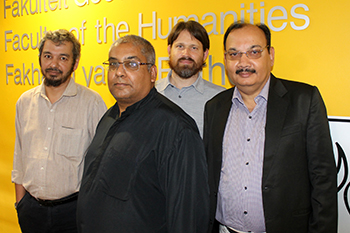
From left are: Prof JM Moosa (Centre for African
Studies, Jawaharlal Nehru University, India),
Prof Hussein Solomon (Senior Professor: Political
Studies and Governance at the UFS),
Prof Virgil Hawkins (Osaka School of International
Public Policy Studies, Osaka University in Japan), and
Prof Ajay Dubey (Centre for African Studies, Jawaharlal Nehru
University, India).
Photo: Jóhann Thormählen
South Africa and the rest of Africa might be standing on the edge of a cliff and therefore conversations are necessary to avoid tipping over. According to Prof Hussein Solomon that was why a conference to address these issues was recently co-hosted by the University of the Free State (UFS).
Prof Solomon, Senior Professor of Political Studies and Governance at the UFS, said the continent and country needed to make the right decisions. “These right choices refer to the correct economic, political, and social policies.”
International delegates attend
Delegates from India, Japan, Zambia, Lesotho and South Africa attended the conference, called A View from the Precipice: Critical Reflections on South Africa and Africa in the 21st Century, on 13 and 14 February 2017 on the Bloemfontein Campus. It was co-hosted by the UFS Department of Political Studies and Governance, Jawaharlal Nehru University (India), Centre for the Engagement on African Peace and Security, Southern African Centre for Collaboration on Peace and Security and Osaka University (Japan).
Prof Solomon said external actors provided a useful mirror as they gave an idea of how Africa and South Africa were viewed from abroad.
Creating a knowledge-sharing forum
“It is not just about sharing knowledge, but creating a forum for sharing knowledge,” said Prof Virgil Hawkins from the Osaka School of International Public Policy Studies.
Prof Hawkins, who is a visiting professor at the UFS, said a conference like this was one of the cornerstones of the relationship between the UFS and Osaka University. Prof Solomon is also a visiting professor at last mentioned university.
Highlights of conference
Prof Solomon said some of the discussions included that “the ANC government is in crisis and is dragging the rest of the country with it”. Another participant said that 80% of the jobs in the next 20 years had not been created yet – which put the relevance of tertiary education in the spotlight.